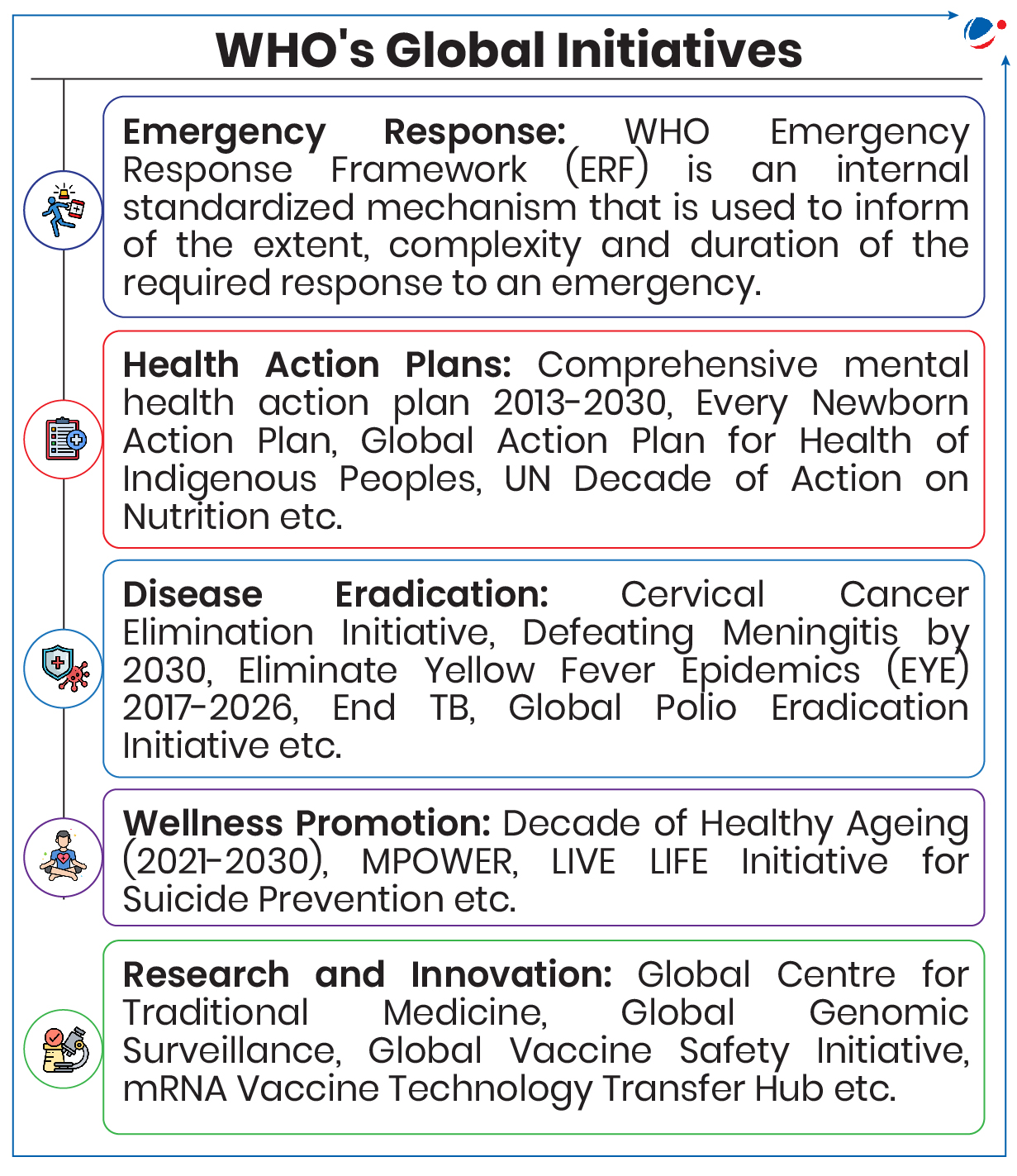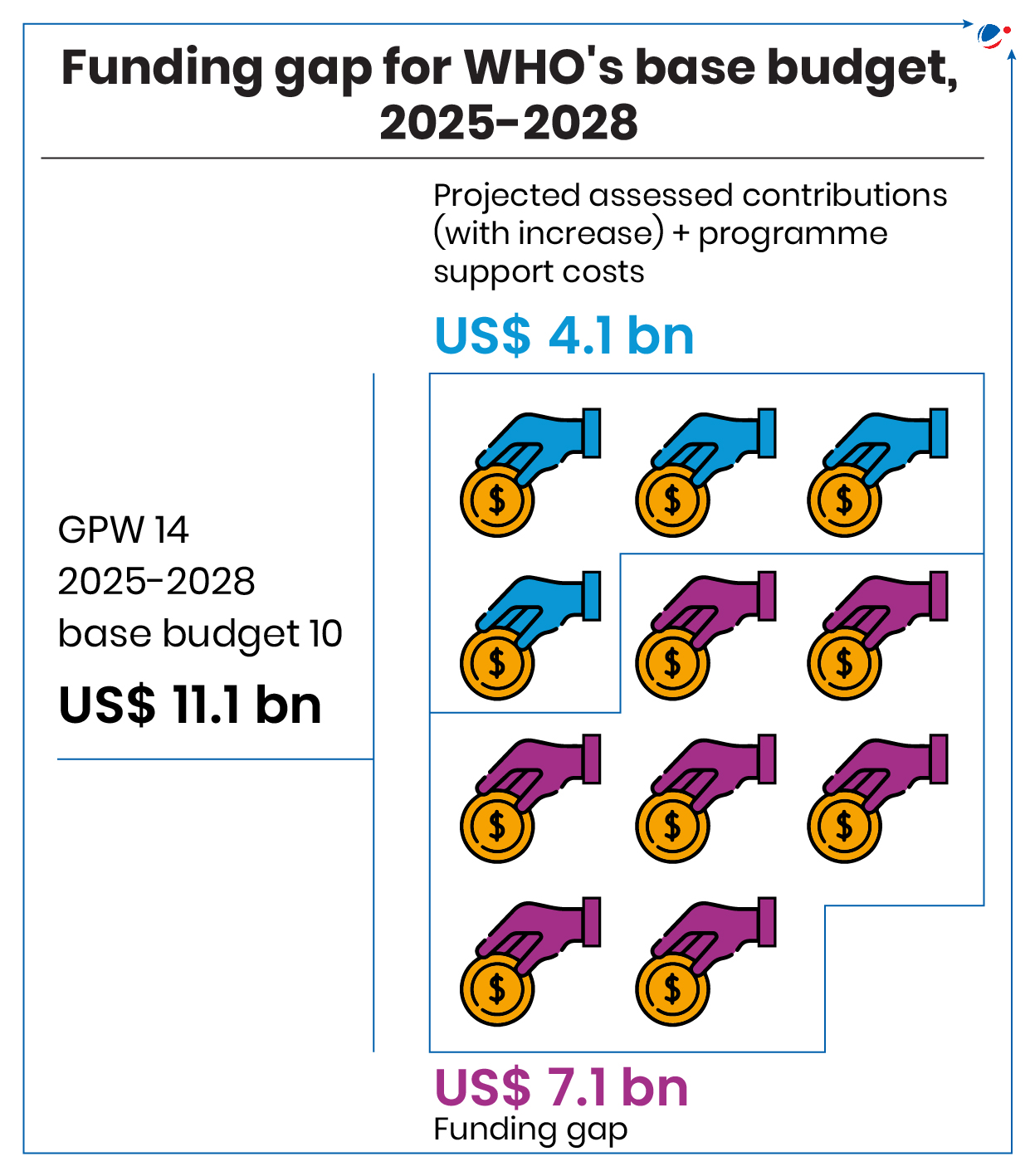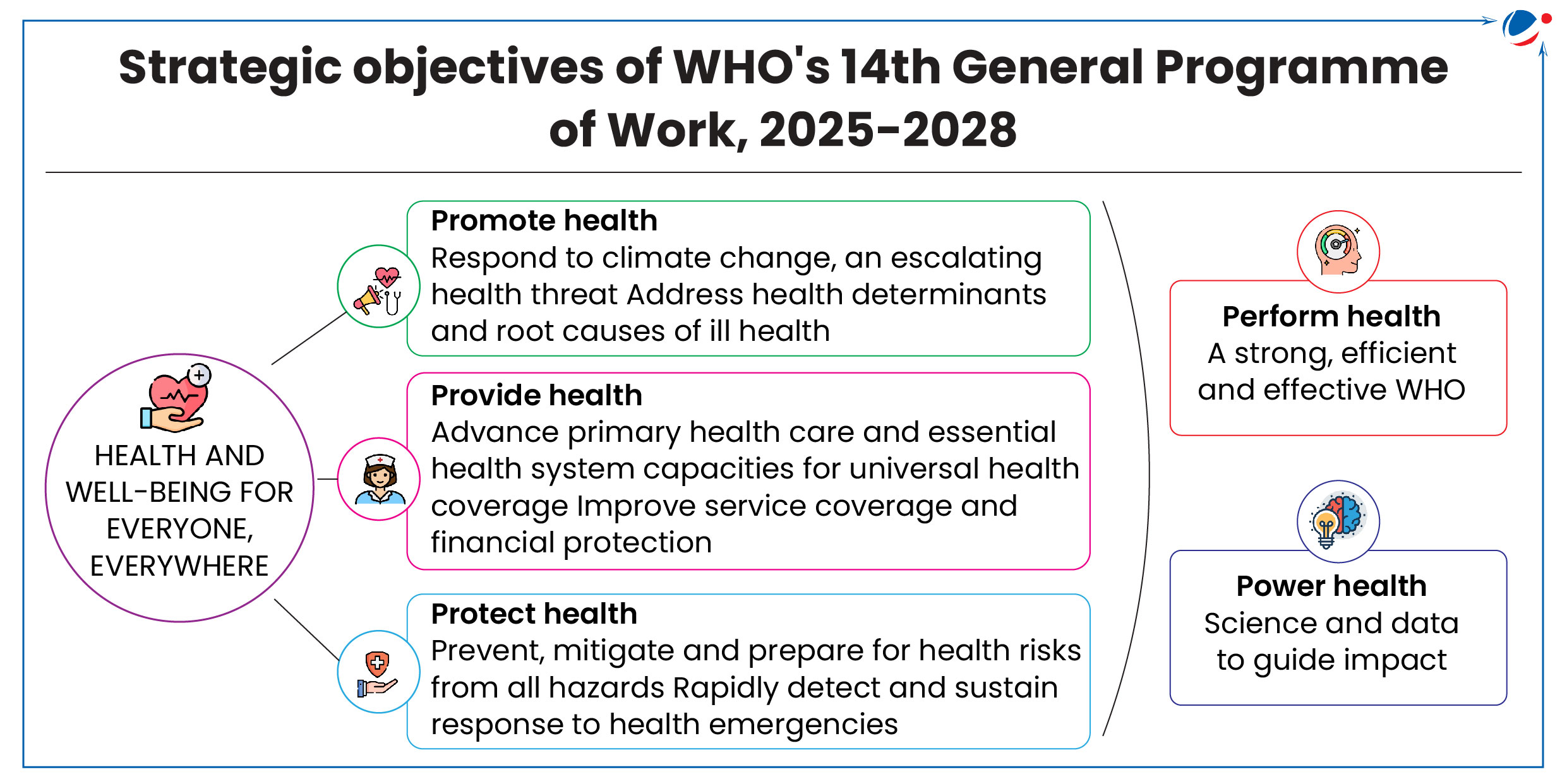Why in the News?
United States announced its withdrawal from WHO, pausing transfer of any funds, support or resources to WHO.
US in WHO
- Founding Member: US was a founding member of WHO in 1948 and has participated in shaping and governing WHO's work ever since.
- Earlier Withdrawal: US earlier withdrew from WHO in 2020 citing following reasons:
- Mishandling of the COVID-19 pandemic and other global health crisis,
- Failure to adopt urgently needed reforms, and
- Its inability to demonstrate independence from the inappropriate political influence of WHO member states.
- Funding from US: For the two-year budget ending in 2025, the U.S. is projected to be WHO's largest single contributor by far.
- It is expected to donate $958 million, or nearly 15%, of the agency's roughly $6.5 billion budget.
About WHO
- UN Agency: The WHO is the United Nation's specialized health agency and is mandated to coordinate the world's response to global health threats.
- Genesis: The International Health Conference held in New York in 1946 adopted the Constitution of WHO, which entered into force in 1948.
- Key Functions: WHO coordinates the world's response to health emergencies, promote well-being, prevent disease and expand access to health care.
- It also provides technical assistance to poorer countries, helps distribute scarce vaccines, supplies and treatments and sets guidelines for hundreds of health conditions, including mental health and cancer.
- Membership: 194 member states grouped into 6 regions (Africa, Americas, Eastern Mediterranean, Europe, South-East Asia, and Western Pacific).
- All countries which are Members of the United Nations may become members of WHO by accepting its Constitution.
- Other countries may be admitted as members when their application has been approved by a simple majority vote of the World Health Assembly.
- Funding: Highest Funding (2020-23) came from the US, Bill & Mellinda Gates Foundation, UK and Germany. Two main sources of funding:
- Assessed contributions (AC): Member States pay their AC, which are a percentage of a country's gross domestic product (Agreed by the United Nations General Assembly).
- Member states approve them every two years at World Health Assembly and they cover less than 20% of total budget.
- Voluntary Contributions (VC): Largely from Member States as well as from other UN organizations, intergovernmental organizations, philanthropic foundations, the private sector, and other sources.
- Assessed contributions (AC): Member States pay their AC, which are a percentage of a country's gross domestic product (Agreed by the United Nations General Assembly).
- Governance and Organizational Structure:
- World Health Assembly (WHA): WHO's highest level decision-making forum, is held annually in Geneva, Switzerland.
- Main functions are to determine policies of organizations, appoint Director-General, supervise financial policies, and review and approve proposed programme budget.
- Executive Board: It gives effect to the decisions and policies of WHA and is headed by the Director-General.
- Director General is appointed by the WHA on the nomination of the Executive Board.
- WHO Secretariat: Includes its Headquarters in Geneva, Switerland, 6 regional offices and other stations located in 150+ countries.
- World Health Assembly (WHA): WHO's highest level decision-making forum, is held annually in Geneva, Switzerland.
 Significance of WHO
|
Shortcomings of WHO
- Poorly coordinated responses to outbreaks: While some criticize the WHO delaying declaration of 2014 Ebola outbreak as PHEIC, others describe its 2009 swine flu response as disproportionate as the outbreak was milder.
- Political Pressures: WHO is believed to be under undue political pressure, especially from China and USA.
- For instance, WHO's endorsement of taxes on soft drinks to reduce sugar consumption met with resistance from beverages industry and US government.
- Complex Organizational Structure: Multiple departments with overlapping tasks, extensive autonomy enjoyed by regional offices, rigid operational processes slows decision making process.
- Absence of financial independence and effective legal powers: makes it too weak to influence states unwilling or unable to cooperate and faces difficulties in dealing with corporations and other non-state actors.
- Conflict of Interest: It is alleged that WHO decisions had been swayed by the interests of the pharmaceutical sector.
WHO Reforms
- Transformation Agenda (2017): It aims at supporting health leadership, providing global goods for public health, and provide tailored support to countries.

- Three-Level Operating Model: Includes country offices, regional offices and headquarters operating as "one WHO" along with creation of a new executive level post of Chief Scientist.
- Also, to assert its authority over these regional power bases, the WHO has begun requiring staff to rotate among posts around the world, similar to a policy at UNICEF.
- Sustainable Financing: WHO launched its first investment round in 2024 to secure funding for WHO's new strategy.
- WHO has also established Agile Member State Task Group for strengthening WHO budgetary, programmatic and financing governance.
- WHO Results Framework: Tracks country-level progress using output scorecards and performance indicators.
- Supply Chain & Logistics: Dedicated Transport & Logistics Hub ensures efficient medical supply delivery.
- Partnerships: WHO Youth Council, WHO Civil Society Commission, WHO Foundation and partnership with organizations such as Google and FIFA.
- Incident Management System: Enables rapid deployment of medical teams, equipment, and medicines during emergencies.






